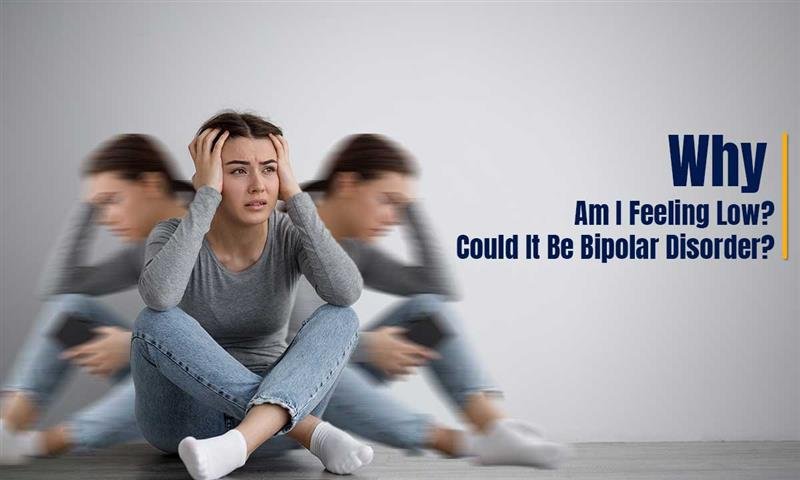
Why Am I Feeling Low? Could It Be Bipolar Disorder?
Have you been wondering, "Why am I feeling low?" If so, you're not alone. Many people experience feeling low at some point in their lives, but when these feelings persist or become overwhelming, they may point to a deeper issue, such as bipolar disorder.
Bipolar disorder, a mood disorder characterized by extreme mood swings, can make individuals feel hopeless or emotionally unstable. In this blog, we will explore the connection between feeling low and bipolar disorder, as well as ways to address these feelings and find the right treatment. If you're questioning whether bipolar disorder is the cause of your low mood, Athena Behavioral Health can help. Schedule a consultation and take control of your mental health.
What Does Feeling Low Mean?
Feeling low typically refers to a state of emotional distress, where you feel sad, withdrawn, or lacking in energy. It can occur in response to a challenging situation, such as a personal loss or stressful event. However, when these feelings last for an extended period or are coupled with extreme mood shifts, they may indicate something more significant, such as bipolar disorder.
In bipolar disorder, the mood changes are not only prolonged but also extreme, often cycling between depression and mania (or hypomania). These shifts can leave individuals feeling emotionally drained, confused, and hopeless, making it difficult to maintain relationships, perform well at work, or engage in daily activities.
Why Am I Feeling Low? Could It Be Bipolar Disorder?
If you find yourself feeling hopeless or persistently sad, it might be worth considering whether these emotions could be linked to bipolar disorder. One of the primary signs of bipolar disorder is the feeling of being low during depressive episodes, often marked by:
- Extreme sadness
- Loss of interest in activities that you once enjoyed
- Fatigue and a lack of energy
- Hopelessness about the future
- Difficulty concentrating or making decisions
These symptoms can be overwhelming and may seem unmanageable without proper help. If left untreated, bipolar disorder can worsen, affecting your overall well-being. Talk to bipolar disorder specialists at Athena Behavioral Health who will guide you with expert diagnosis and treatment.
Symptoms of Bipolar Disorder
Understanding the symptoms of bipolar disorder can help you identify whether your feeling low is connected to this condition. Bipolar disorder involves two main mood states: mania and depression. These mood swings can vary in intensity and duration:
1. Depressive Episode
During a depressive episode in bipolar disorder, the individual may experience the following:
- Persistent sadness or emptiness
- Feelings of hopelessness
- Loss of interest in previously enjoyed activities
- Difficulty sleeping or sleeping too much
- Changes in appetite (either overeating or not eating at all)
- Thoughts of death or suicidal thoughts
2. Manic or Hypomanic Episode
In contrast, during a manic or hypomanic episode, the individual may experience:
- Excessive energy
- Racing thoughts
- Grandiose thoughts or inflated self-esteem
- Impulsivity, such as reckless spending or risky behavior
- Decreased need for sleep
Best Psychiatry Treatment When Feeling Low
Psychiatric treatment for bipolar disorder often includes a combination of medication and psychotherapy. Medications, such as mood stabilizers, antipsychotics, and antidepressants, are commonly prescribed to help balance the mood swings. Athena Behavioral Health provides specialized care for bipolar disorder treatments.
Psychotherapy or talk therapy can help individuals learn how to manage their emotions and develop coping strategies for dealing with difficult situations.
If you are in need of the best psychiatrists in Gurgaon for treatment when feeling low, it's important to choose a professional who has experience with mood disorders, particularly bipolar disorder. In areas like Gurgaon, finding a highly recommended psychiatrist with a proven track record in treating depression and bipolar disorder can make a significant difference in your recovery journey.
Conclusion:
If you’re asking yourself, "Why am I feeling low?" and suspect it could be related to bipolar disorder, it’s important to seek professional help. Bipolar disorder is a complex condition, but with the right treatment, it is manageable. Psychiatric treatment for bipolar disorder, including medication and therapy, can help you regain control of your life and improve your emotional well-being. Whether you're in Gurgaon or elsewhere, finding the right psychiatrist who understands bipolar disorder is the first step towards feeling better.



